
Hãy nhập câu hỏi của bạn vào đây, nếu là tài khoản VIP, bạn sẽ được ưu tiên trả lời.



\(2Al\left(OH\right)_3+3H_2SO_4\underrightarrow{trao..đổi}Al_2\left(SO4\right)_3+6H_2O\)
tỉ lệ số phân tử \(Al\left(OH\right)_3\):\(H_2SO_4\):\(Al_2\left(SO4\right)_3\):\(H_2O\) là 2:3:1:6
\(BTKL:mAL\left(OH\right)_3+mH_2SO_4=mAl_2\left(SO4\right)_3+mH_2O\)
23,4 \(+\) \(mH_2SO_4\) = 51,3 + 16,2
=>\(mH_2SO4=\left(51,3+16,2\right)-23,4=44,1\left(gam\right)\)



Science and technology has become a debated topic in the society. On one hand, it is necessary for the modern life where other countries are continuously developing in the field of science and technology. It becomes very necessary for other countries too to grow in the same way to be strong and well developed other countries for the future safety and security. It is science and technology which helps other weak countries to develop and be strong. We have to take support of science and technology forever to improve the way of life for the betterment of mankind. If we do not take the help of technologies such as computer, internet, electricity, etc we cannot be economically strong in the future and would be backward forever even we cannot survive in such a competitive and technological world.
Advancement in the field of medical, agriculture, education, economy, sports, games, jobs, tourism, etc are the examples of science and technology. All such advancements show us that how both are equally beneficial for our life. We can see a clear difference in our life style while matching the ancient and modern way of life. High level of scientific and technological advancement in the field of medicine has made easy the treatment of various lethal diseases which was earlier not possible. It has helped a lot to the doctors to find effective ways to cure diseases through medicine or operations as well as research vaccines to cure diseases such as cancer, AIDS, diabetes, Alzheimer’s, Leukemia, etc.


a, \(n_{CaCO_3}=\dfrac{41,2}{100}=0,412\left(mol\right)\)
PTHH: CaO + H2O → Ca(OH)2
Mol: 0,412 0,412
PTHH: Ca(OH)2 + CO2 → CaCO3 + H2O
Mol: 0,412 0,412 0,412
\(m_{CaO}=0,412.56=23,072\left(g\right)\)
b, \(V_{CO_2}=0,412.22,4=9,2288\left(l\right)\)
\(m_{Na_2CO_3}=100.16,96\%=16,96\left(g\right)\Rightarrow n_{Na_2CO_3}=\dfrac{16,96}{106}=0,16\left(mol\right)\)
\(m_{BaCl_2}=200.10,4\%=20,8\left(g\right)\Rightarrow n_{BaCl_2}=\dfrac{20,8}{208}=0,1\left(mol\right)\)
PTHH: Na2CO3 + BaCl2 → BaCO3 + 2NaCl
Mol: 0,1 0,1 0,2
Ta có: \(\dfrac{0,16}{1}>\dfrac{0,1}{1}\) ⇒ Na2CO3 dư, BaCl2 hết
mdd sau pứ = 100 + 200 = 300 (g)
\(C\%_{ddNaCl}=\dfrac{0,1.58,5.100\%}{300}=1,95\%\)
\(C\%_{ddNa_2CO_3}=\dfrac{\left(0,16-0,1\right).106.100\%}{300}=2,12\%\)

1. a, PTK CO2: 12 + 16 . 2 = 44 (đvC)
b, PTK H2O: 2 + 16 = 18 (đvC)
c, PTK KNO3: 39 + 14 + 16 . 3 = 101 (đvC)
d, PTK Fe2(SO4)3: 56 . 2 + (32 + 16 . 4) . 3 = 400 (đvC)
e, PTK Br2: 80 . 2 = 160 (đvC)
2. a, CuO
b, Al2O3
c, Ba3(PO4)2
3. nFe = 5,6/56 = 0,1 (mol)
nCl2 = 10,65/71 = 0,15 (mol)
PTHH: 2Fe + 3Cl2 -> (t°) 2FeCl3
LTL: 0,1/2 = 0,15/3 => ko có chất dư
nFeCl3 = 0,1 (mol)
mFeCl3 = 0,1 . 162,5 = 16,25 (g)
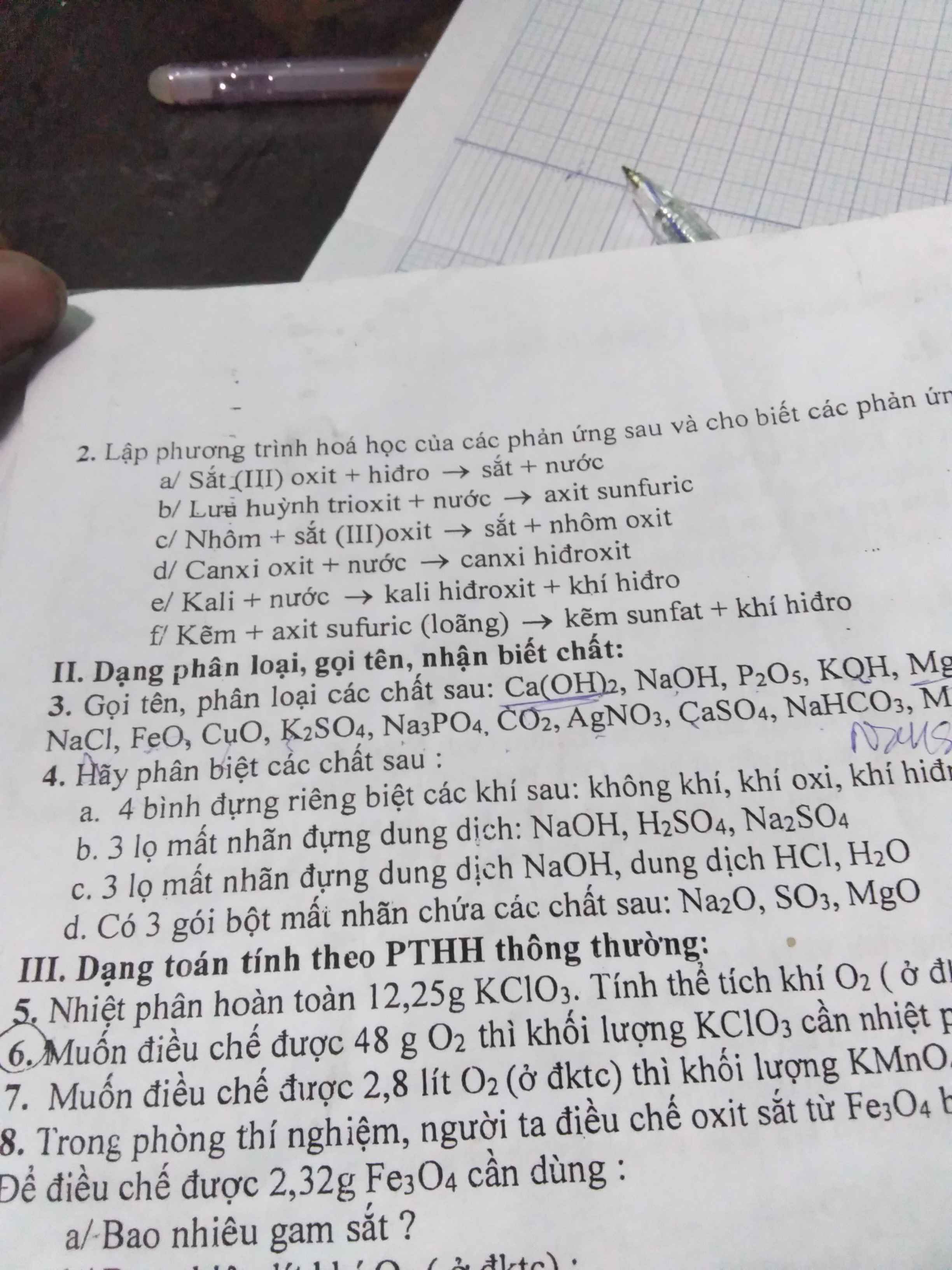
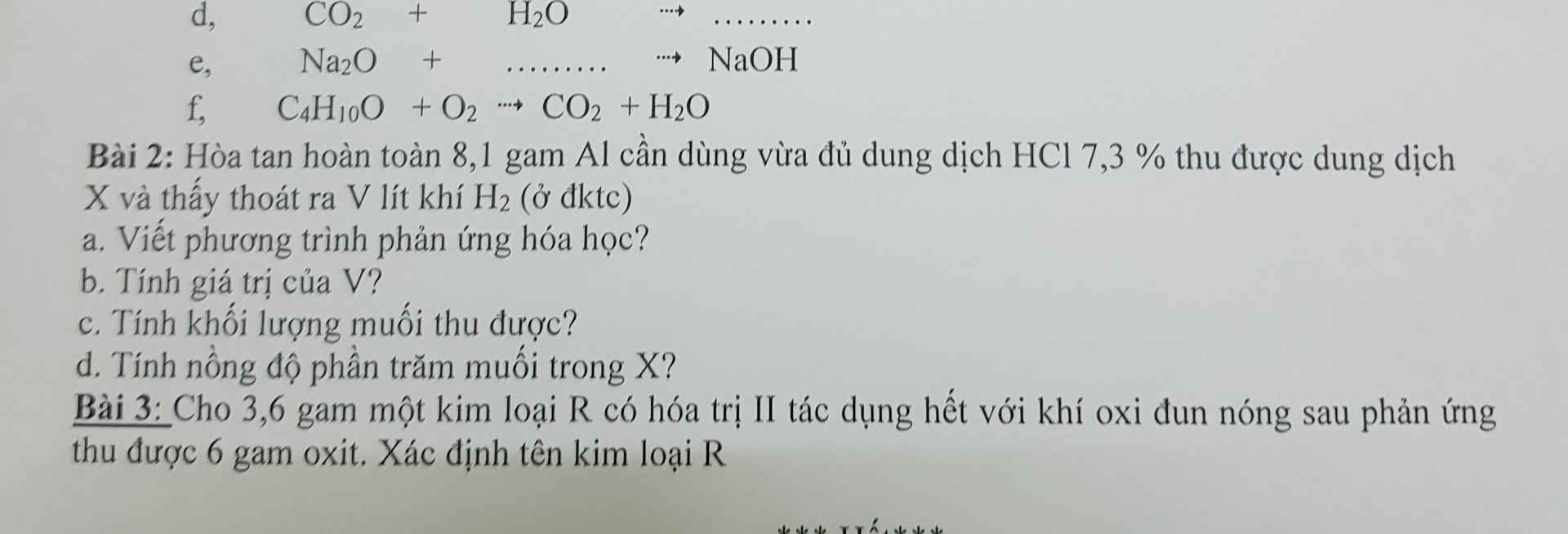
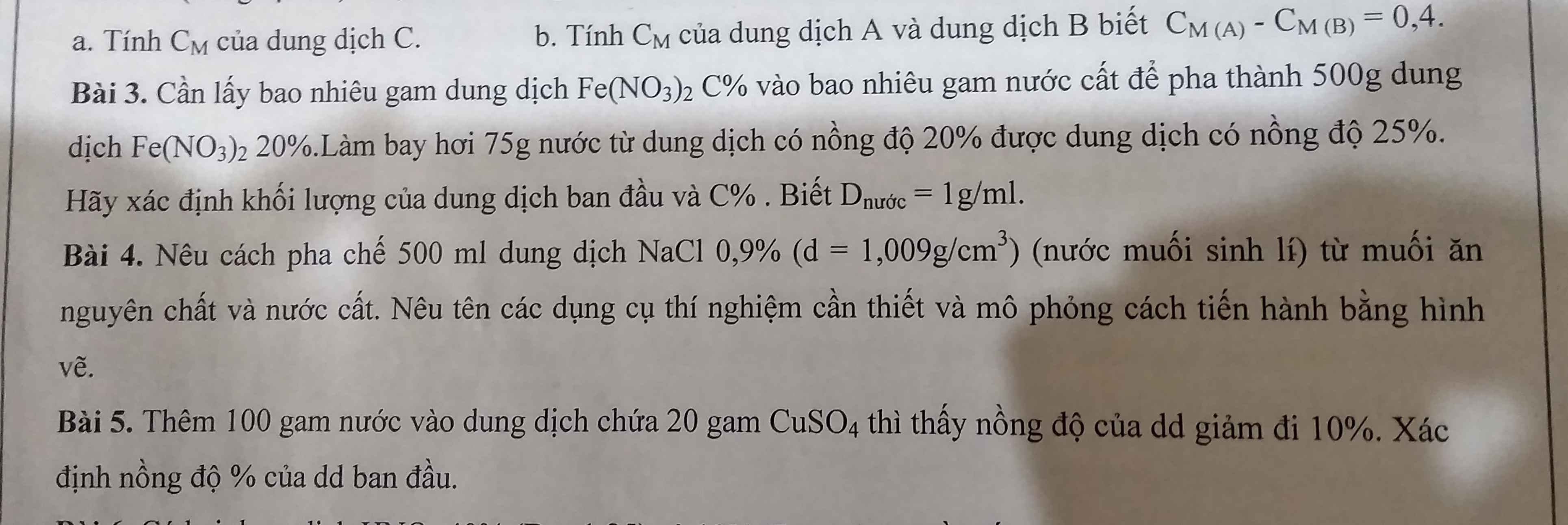

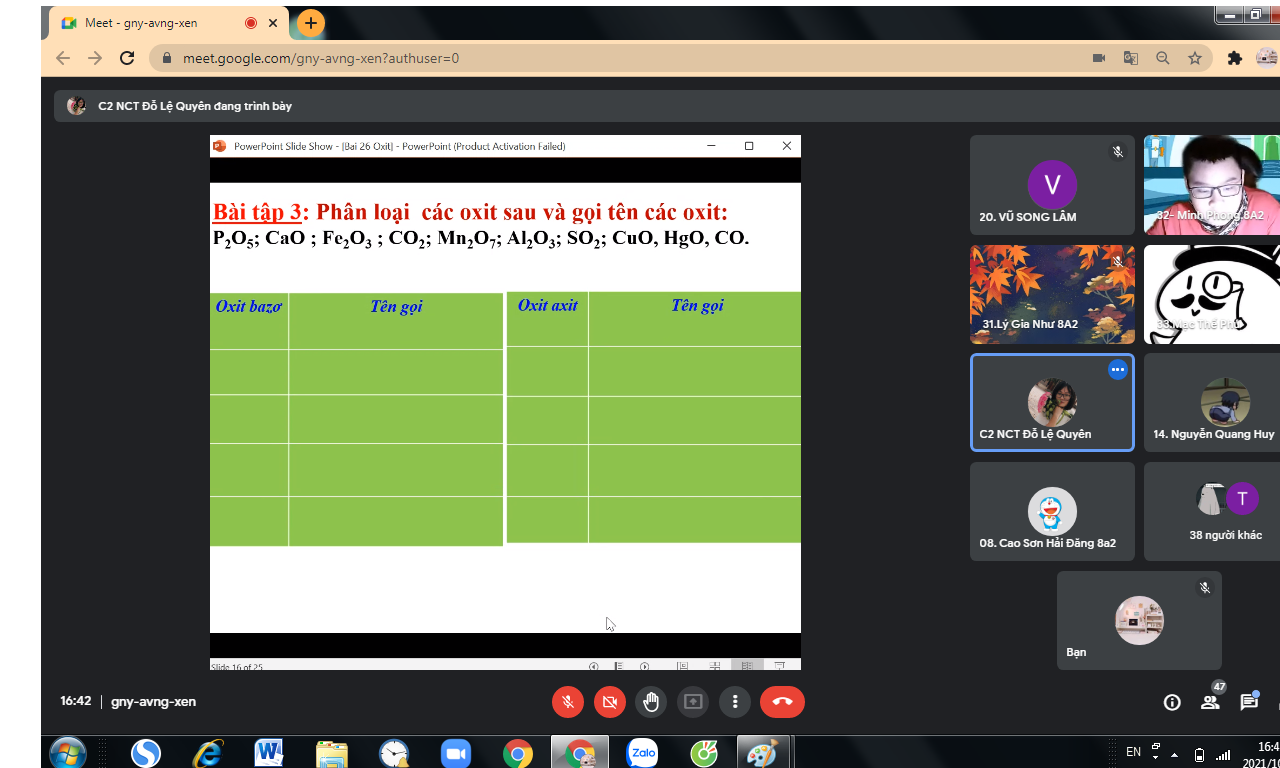

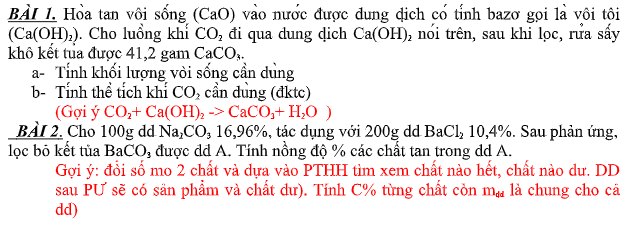
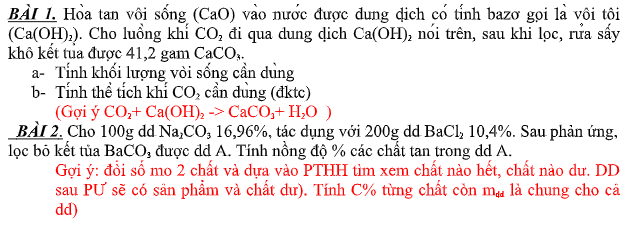
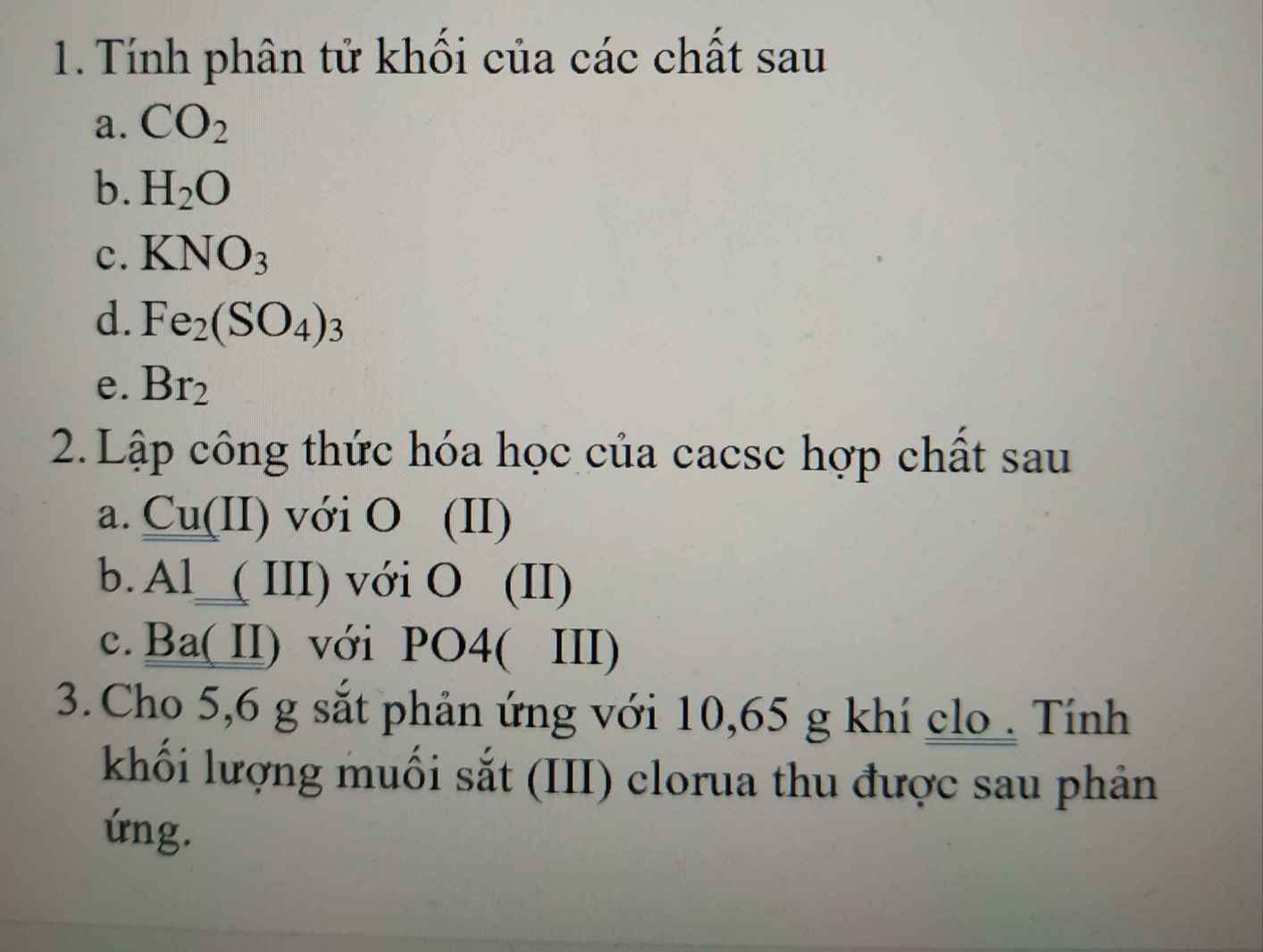
Em chụp anh thấy cứ bị xén đi 1 góc nội dung á em!